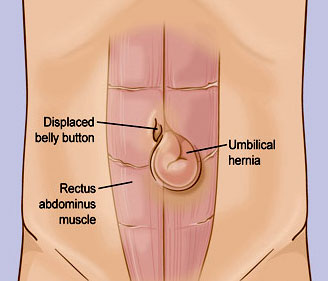Umbilical Hernia Causes, Symptoms, Diagnosis and Treatment

What Is Umbilical Hernia?
An umbilical hernia occurs when part of the intestine protrudes through the umbilical opening in the abdominal muscles.
In children, if the hernia is still there by the time the child is 4 years old, the doctor may recommend surgery.
To prevent complications, umbilical hernias that don’t disappear by age 4 or those that appear during adulthood may need surgical repair.
Causes Of Umbilical Hernia:
There are different causes for the occurrence of umbilical hernia in adults and children.
- Children
The reason for umbilical hernia in children lies in complication before birth. While the developing fetus is in the uterus (womb), the umbilical cord passes through an opening in the abdominal wall, which should close before the baby is born, or soon after.
However, sometimes the muscles do not completely seal, leaving a weak spot through which an umbilical hernia can develop.
- Adults
Possible causes for adults include:
- Obesity
- Multiple pregnancies
- Fluid in the abdominal cavity (ascites)
- Previous abdominal surgery
- Chronic peritoneal dialysis
- Too much abdominal pressure
Symptoms Of Umbilical Hernia:
Umbilical hernia is marked by the following symptoms:
- Soft swelling or bulge near the navel
- The bulge becomes discolored
- Pain
- Vomiting
Diagnosis Of Umbilical Hernia:
The following tests and exam are taken in order to diagnose Umbilical hernia:
- Physical exam
- X-ray
- C-T scan
- Abdominal ultrasound
- Blood tests to check for infections
Treatment Of Umbilical Hernia:
Most umbilical hernia in babies closes on their own by the age of two. However, if this does not happen, surgery may be performed.
For children, surgery is typically reserved for umbilical hernias that:
- Are painful
- Are bigger than 1.5 centimeters in diameter (slightly larger than a 1/2 inch)
- Are large and don’t decrease in size over the first two years
- Don’t disappear by age 4
- Become trapped or block the intestines
For adults, surgery is typically recommended to avoid possible complications — especially if the umbilical hernia gets bigger or becomes painful.
By : Natural Health News




